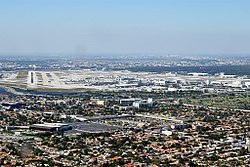
Back Miami Internasionale Lughawe Afrikaans مطار ميامي الدولي Arabic مطار ميامى الدولى ARZ Aeropuertu Internacional de Miami AST মায়ামি আন্তর্জাতিক বিমানবন্দর Bengali/Bangla Aeroport Internacional de Miami Catalan Miami International Airport CEB فڕۆکەخانەی نێونەتەوەییی مەیامی CKB Mezinárodní letiště v Miami Czech Miami International Airport German
Miami International Airport | |||||||||||||||||||||||
|---|---|---|---|---|---|---|---|---|---|---|---|---|---|---|---|---|---|---|---|---|---|---|---|
 | |||||||||||||||||||||||
 | |||||||||||||||||||||||
| Summary | |||||||||||||||||||||||
| Airport type | Public | ||||||||||||||||||||||
| Owner/Operator | Miami-Dade Aviation Department (MDAD) | ||||||||||||||||||||||
| Serves | Miami metropolitan area | ||||||||||||||||||||||
| Location | Miami-Dade County, Florida, U.S. | ||||||||||||||||||||||
| Opened | 1928 | ||||||||||||||||||||||
| Hub for | |||||||||||||||||||||||
| Focus city for | |||||||||||||||||||||||
| Operating base for | |||||||||||||||||||||||
| Time zone | EST (UTC−05:00) | ||||||||||||||||||||||
| • Summer (DST) | EDT (UTC−04:00) | ||||||||||||||||||||||
| Elevation AMSL | 3 m / 9 ft | ||||||||||||||||||||||
| Coordinates | 25°47′36″N 080°17′26″W / 25.79333°N 80.29056°W | ||||||||||||||||||||||
| Website | www | ||||||||||||||||||||||
| Maps | |||||||||||||||||||||||
 FAA airport diagram | |||||||||||||||||||||||
 | |||||||||||||||||||||||
| Runways | |||||||||||||||||||||||
| |||||||||||||||||||||||
| Statistics (2023) | |||||||||||||||||||||||
| |||||||||||||||||||||||
Miami International Airport (IATA: MIA, ICAO: KMIA, FAA LID: MIA) — also known as MIA and historically as Wilcox Field — is the primary international airport serving Miami, Florida and its metropolitan area with over 1,000 daily flights to 185 domestic and international destinations, including most countries in Latin America. The airport is in an unincorporated area in Miami-Dade County,[4] 8 miles (13 km) west-northwest of Downtown Miami, in metropolitan Miami,[2] adjacent to the cities of Miami and Miami Springs, and the village of Virginia Gardens. Nearby cities include Hialeah, Doral, and the Census-designated place of Fontainebleau.
In 2021, Miami International Airport became the busiest international cargo airport in the U.S.[5][6][7] and the busiest U.S. gateway for international passengers, surpassing John F. Kennedy International Airport in New York City.[8][9] As of 2021, it is the 10th busiest airport in the U.S. with 17,500,096 passengers for the year. It is Florida's busiest airport by total aircraft operations, total cargo traffic and total passenger traffic.[10] The airport is American Airlines' third-largest hub and serves as its primary gateway to Latin America and the Caribbean. Miami also serves as a focus city for Avianca, Frontier Airlines, and LATAM, both for passengers and cargo operations.
Miami International Airport covers 1,335 hectares (3,300 acres).[2][11] It is South Florida's main airport for long-haul international flights and a hub for the Southeastern United States with passenger and cargo flights to cities throughout the Americas, Europe, Africa, and Asia. It is the largest gateway between the U.S. and Latin America and the Caribbean and one of the largest airline hubs in the nation.
- ^ Liu, Jim (June 1, 2023). "Norse Atlantic begins Miami service from Sep 2023". AeroRoutes. Retrieved June 1, 2023.
- ^ a b c FAA Airport Form 5010 for MIA PDF, effective January 25, 2024.
- ^ "MIA Airport 2023 Yearly Traffic Report". miami-airport.com. Retrieved February 14, 2024.
- ^ "2020 CENSUS - CENSUS BLOCK MAP: Miami-Dade County, FL" (PDF). U.S. Census Bureau. p. 31 (PDF p. 32/154). Retrieved August 13, 2022.
Miami International Arprt
- ^ STAT Times (April 14, 2022). "MIA ranked America's busiest international cargo airport, again". Stattimes.com. Retrieved May 15, 2022.
- ^ "Miami International Airport sets new record for cargo shipments in 2020". February 3, 2021.
- ^ "MIA ranked America's busiest international airport".
- ^ "MIA ranked America's busiest international airport".
- ^ "Miami busiest international airport cargo - Yahoo Search Results".
- ^ "Miami Dominates US to Latin America and Caribbean". anna.aero Airline News & Analysis. April 27, 2010. Archived from the original on May 2, 2010. Retrieved April 27, 2010.
- ^ "MIA airport data at skyvector.com". skyvector.com. Retrieved August 23, 2022.